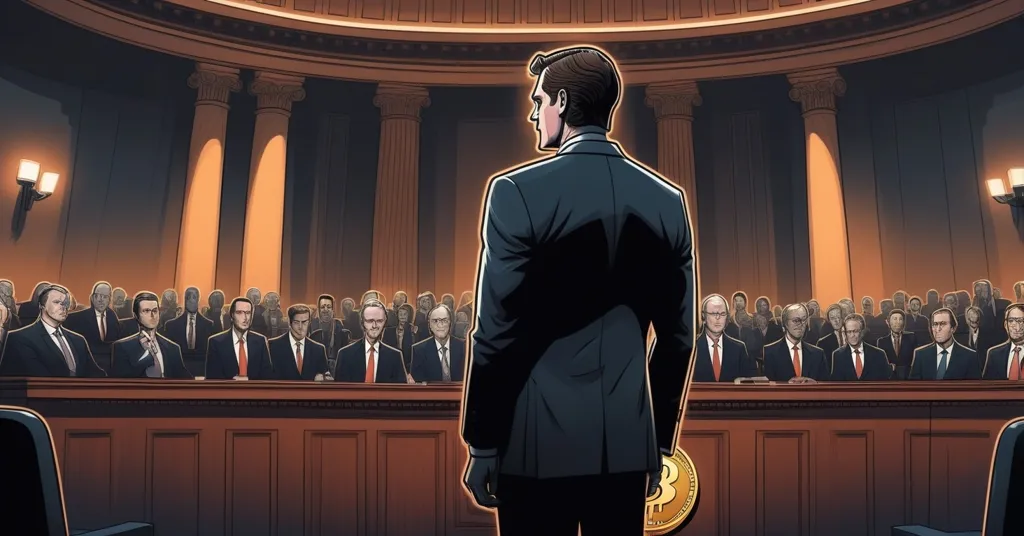Michael Selig Faces Senate Scrutiny in Bid to Lead CFTC and Shape Crypto Rules

Senators Grill Crypto Regulator Michael Selig in High-Stakes Bid to Lead CFTC
Michael Selig, the chief counsel for the SEC’s Crypto Task Force, found himself in the hot seat on Wednesday during a Senate Agriculture Committee hearing to decide if he’s the right fit to lead the Commodity Futures Trading Commission (CFTC). With the global digital asset market now a colossal $4 trillion force, Selig’s potential confirmation could reshape U.S. crypto regulation—either steering it toward innovation-friendly clarity or leaving it mired in bureaucratic mess and political gridlock.
- High-Stakes Nomination: Selig’s leadership could pivot U.S. crypto policy toward clear rules over punitive enforcement.
- CFTC in Shambles: The agency limps along with one commissioner, stalling critical decisions for digital assets.
- DeFi Under the Lens: Senators pressed Selig on navigating the murky waters of decentralized finance.
Selig’s Vision: Clarity Over Crackdowns for Crypto
The hearing wasn’t just another Capitol Hill snoozefest—it was a gauntlet for Selig to prove he can balance the chaotic dance of blockchain innovation with regulatory oversight. As digital assets have exploded from a geeky side project to a near $4 trillion global powerhouse, the U.S. is teetering on the edge of either leading or losing this financial revolution. Selig pulled no punches, warning that the country’s obsession with slapping fines and penalties instead of laying out straightforward rules is a fast track to irrelevance. If you want deeper insight into the intense scrutiny he faced, check out the detailed coverage on Selig’s high-stakes Senate hearing.
“Markets all over the world are shifting rapidly, and the U.S. risks falling behind if regulators rely too heavily on enforcement rather than clear regulations,”
he stated bluntly, hammering home the need for a sensible framework. He didn’t stop there, adding a stark caution:
“Aggressive actions would push firms overseas and weaken American competitiveness.”
His words echo the frustrations of many in the crypto space—Bitcoin maximalists and altcoin advocates alike—who’ve watched companies flee to places like Singapore or Switzerland, where regulators seem to get that blockchain isn’t just a fad. For Bitcoin specifically, clear CFTC rules could mean institutional giants finally feel safe piling into BTC futures, potentially supercharging adoption. But let’s play devil’s advocate for a second: what if “clarity” turns into a bureaucratic straitjacket, choking off Bitcoin’s raw, decentralized spirit or Ethereum’s cutting-edge experiments with layer-2 scaling? Overregulation disguised as guidance is still a cage.
For those just dipping their toes into this regulatory swamp, the CFTC is the U.S. agency tasked with overseeing futures and commodity markets, including a growing chunk of crypto trading platforms. It often clashes with the Securities and Exchange Commission (SEC)—where Selig currently works—over who gets to call the shots on digital assets. Picture two chefs bickering over a kitchen while cooking a dish that’s half soup, half cake: many cryptocurrencies, like Bitcoin, blur the lines between commodities (CFTC turf) and securities (SEC territory). This overlap has historically been a mess—think back to 2017-2018 when Bitcoin futures launched, and both agencies squabbled over jurisdiction. The result? Confusion for businesses and a regulatory patchwork that’s driven innovation offshore.
CFTC in Crisis: A Regulatory Roadblock for Crypto
Selig’s nomination lands at a time when the CFTC is basically running on fumes. Instead of its usual five commissioners, it’s down to just one—Acting Chair Caroline Pham. This isn’t a minor hiccup; it’s a full-blown crisis. Without a quorum, the agency can’t make big decisions, leaving crypto firms—whether Bitcoin-focused exchanges or Ethereum DeFi protocols—in a frustrating limbo. Senator Amy Klobuchar didn’t hold back on the fallout.
“More chaos for people who depend on the CFTC,”
she declared, underscoring how this leadership vacuum screws over businesses needing stable oversight to operate. Imagine trying to steer a $4 trillion ship with a skeleton crew—that’s the CFTC right now. Reports from industry trackers like CoinGecko show dozens of crypto firms have already relocated to jurisdictions with clearer rules, a trend Selig’s confirmation would need to reverse pronto.
If Selig gets the nod, things could get even dicier in the short term. Word is that Pham plans to resign upon his confirmation, potentially leaving all four remaining commissioner seats empty unless the administration pulls off a miracle and fills them fast. That’s not just paralysis—it’s a death knell for timely policy on Bitcoin futures or digital asset trading rules. For hodlers and traders, this means more uncertainty: will BTC derivatives get the green light to expand, or will the CFTC’s dysfunction spook markets further? And let’s not forget the budget constraints—public data shows the CFTC’s funding has lagged behind its workload for years, a problem Selig would inherit alongside an empty boardroom.
Decoding DeFi: The Next Regulatory Frontier
Now, let’s unpack the wild frontier of decentralized finance—or DeFi—that had senators scratching their heads during the hearing. If you’re new to this, DeFi refers to blockchain-based systems that ditch traditional middlemen like banks. Using self-executing code called smart contracts, often on networks like Ethereum, it enables peer-to-peer lending, borrowing, and trading. It’s the libertarian dream of finance without overlords, but it’s also a magnet for scams and systemic risks—think $600 million hacks like the Poly Network exploit in 2021 or shaky stablecoins like Tether (USDT) fueling DeFi protocols. Selig tackled this head-on, refusing to either worship or vilify the tech.
“DeFi is often just a vague term, [but] regulators need to understand how on-chain applications work,”
he said, pushing for a deep dive into the nuts and bolts. By “on-chain applications,” he means programs running on blockchain networks that automate transactions—no human middleman needed. His point? Regulators must grasp these systems and spot risks similar to traditional finance, like fraud or market crashes, without smothering the innovation that makes DeFi tick. It’s a tightrope walk, especially when DeFi’s anonymity can be a playground for money laundering—a harsh reality Selig can’t ignore, even if us Bitcoin purists cheer the freedom it offers.
But here’s the flip side: clamping down too hard on DeFi could kill the very experiments that push blockchain forward. Ethereum’s dominance in this space, with its smart contracts powering most DeFi apps, shows why Selig can’t just focus on Bitcoin—even if we maximalists grumble about altcoin distractions. Protocols like Solana, with lightning-fast transactions, also carve out niches Bitcoin doesn’t touch. Still, unchecked DeFi chaos could drag down the whole crypto ecosystem, including BTC, if a major collapse shakes public trust. Selig’s got to thread this needle, and fast.
Political Poker: Navigating a Trump-Era Switch
Selig’s past at the SEC didn’t escape scrutiny either. Senators grilled him on whether his ties to digital asset firms might bias his judgment, while others, like Committee Chairman Senator John Boozman, zeroed in on his plans for the digital commodity spot market—think immediate buying and selling of crypto, unlike futures which are bets on future prices. Selig stuck to his guns: without clear frameworks, the U.S. can’t hope to lead a global market sprinting ahead at warp speed.
Then there’s the political wildcard. Selig’s nomination came after President Donald Trump yanked his first pick, Brian Quintenz, for reasons as murky as a bad NFT drop. Swapping nominees like trading cards isn’t the stability crypto needs, but hey, unpredictability is practically blockchain’s middle name. The Senate Agriculture Committee isn’t dragging its feet—discussions on Selig’s fate kicked off as early as Thursday post-hearing, with a vote looming. If political headwinds or agency dysfunction stall this, we’re looking at more regulatory quicksand for an industry already tired of sinking.
Why Selig’s CFTC Role Matters for Bitcoin and Crypto
Let’s cut through the noise: Selig’s potential leadership isn’t just about one guy or one agency—it’s about whether the U.S. can ride the crypto wave without wiping out. If confirmed, he faces a damn near impossible job. He’d inherit a CFTC on life support, with understaffing threatening to halt everything. He’d also need to square off against ideological battles—pitting the crypto crowd’s thirst for freedom against old-school suits who see digital assets as a ticking time bomb. Scammers will always slither through cracks, and Selig better have a solid plan to crush them without crushing innovation.
From a Bitcoin maximalist lens, his push for clarity over SEC-style sledgehammer tactics is a breath of fresh air. It could let Bitcoin solidify as the king of decentralized money, unshackling finance from overbearing control. Clearer futures markets might lure institutional cash into BTC, boosting its legitimacy without compromising the hodler ethos of privacy and sovereignty. But let’s not get too cozy—Ethereum’s DeFi experiments and other chains like Solana prove the broader ecosystem matters, even if Bitcoin remains the gold standard. Selig ignoring altcoins would be like a chef ignoring half the pantry; it just won’t work.
Still, execution is where empires rise or fall. If Selig can’t rebuild the CFTC while fending off political vultures, we’re in for more chaos—and likely more firms packing their bags for greener pastures. His nomination is a litmus test: can the U.S. adapt to a financial uprising, or will it keep shooting itself in the foot with red tape and infighting? The crypto world, from Bitcoin OGs to newbie traders, is watching with bated breath.
Key Questions on Michael Selig’s CFTC Nomination and Crypto Regulation
- What impact could Michael Selig have on U.S. crypto regulation?
If confirmed, Selig might steer the CFTC toward innovation-friendly policies, strengthening the U.S. as a hub for Bitcoin and broader crypto platforms while addressing risks in decentralized finance (DeFi). - Why is the CFTC staffing crisis a problem for Bitcoin and crypto markets?
Operating with only one commissioner, the CFTC can’t make key decisions on Bitcoin futures or digital asset rules, leaving businesses and investors stuck in uncertainty. - How does Selig plan to handle decentralized finance (DeFi) oversight?
He stresses the need to understand blockchain tech behind DeFi on networks like Ethereum, aiming to manage risks like fraud without killing the innovation driving a $4 trillion industry. - What are the risks of harsh U.S. crypto enforcement policies?
Selig warns that brutal crackdowns could drive Bitcoin startups and other crypto firms to friendlier countries, costing the U.S. its lead in the global blockchain race. - What challenges await Selig as potential CFTC head?
He’s up against a crippled agency with severe understaffing, political resistance, and the monumental task of shaping Bitcoin and crypto policies with a potentially empty commission, risking deeper regulatory turmoil.
What’s Next for Selig and Crypto?
The vote on Selig’s nomination is just the first hurdle in a marathon of challenges. Whether he can transform the CFTC from a dysfunctional relic into a beacon of sensible oversight remains the billion—or $4 trillion—dollar question. For Bitcoin enthusiasts, his success could mean a clearer path to mainstream acceptance without sacrificing the decentralized ethos. For the wider crypto space, including Ethereum’s DeFi pioneers, it’s about ensuring innovation doesn’t get buried under red tape. One thing’s for sure: the stakes couldn’t be higher, and the clock is ticking louder than a Bitcoin miner’s rig.



